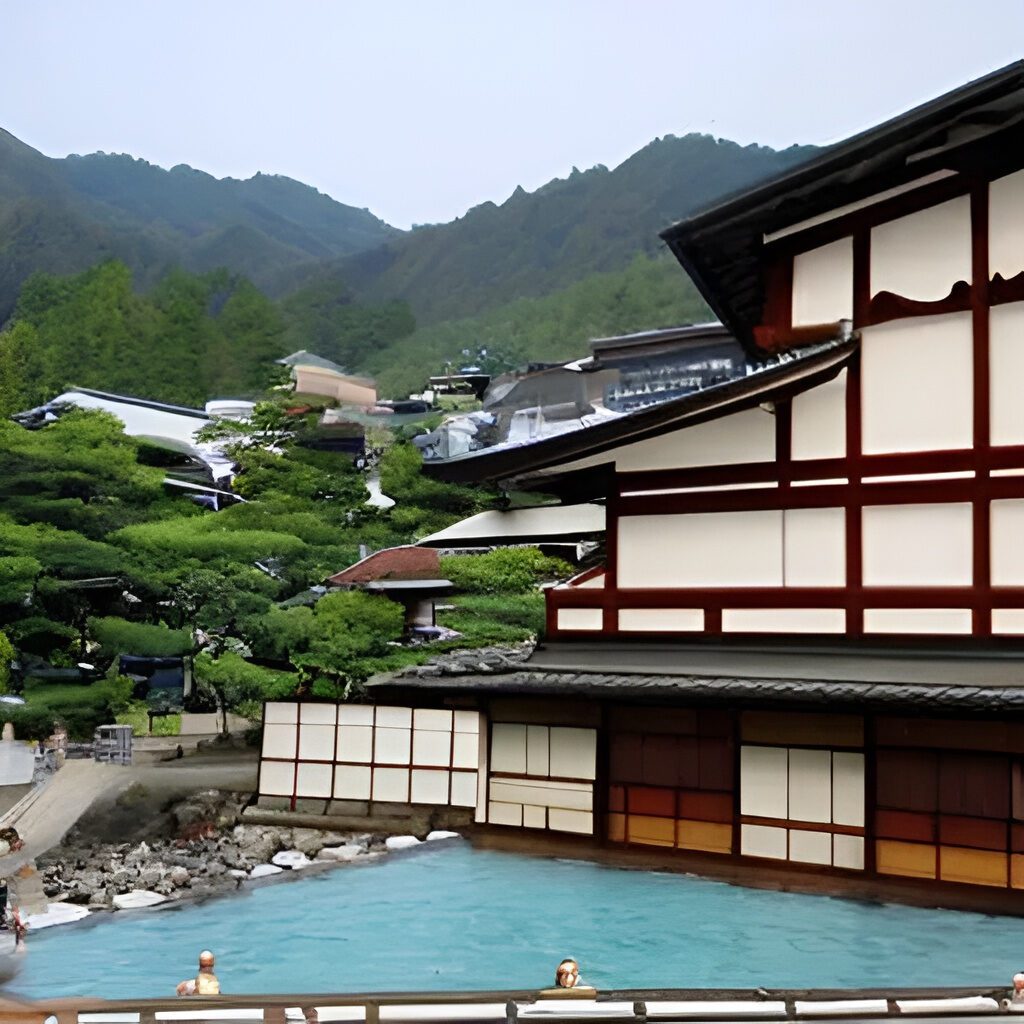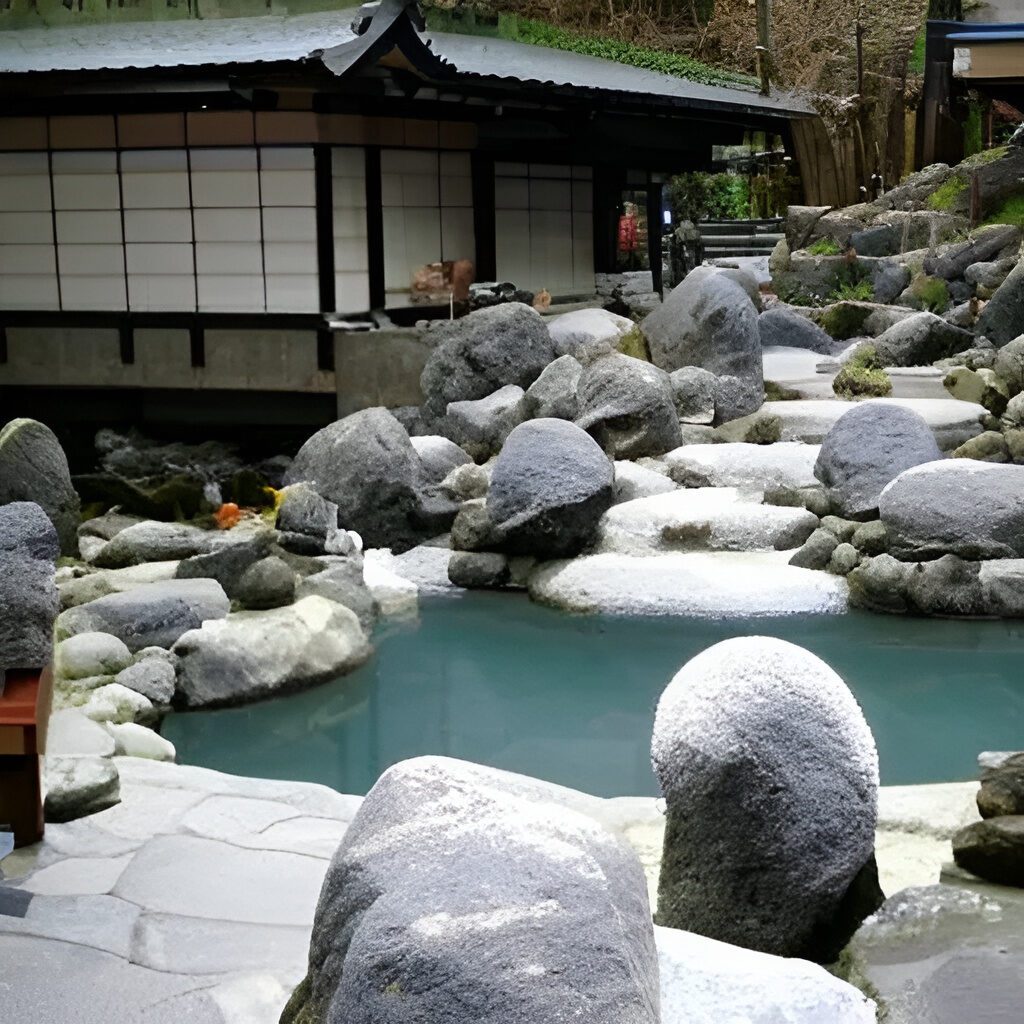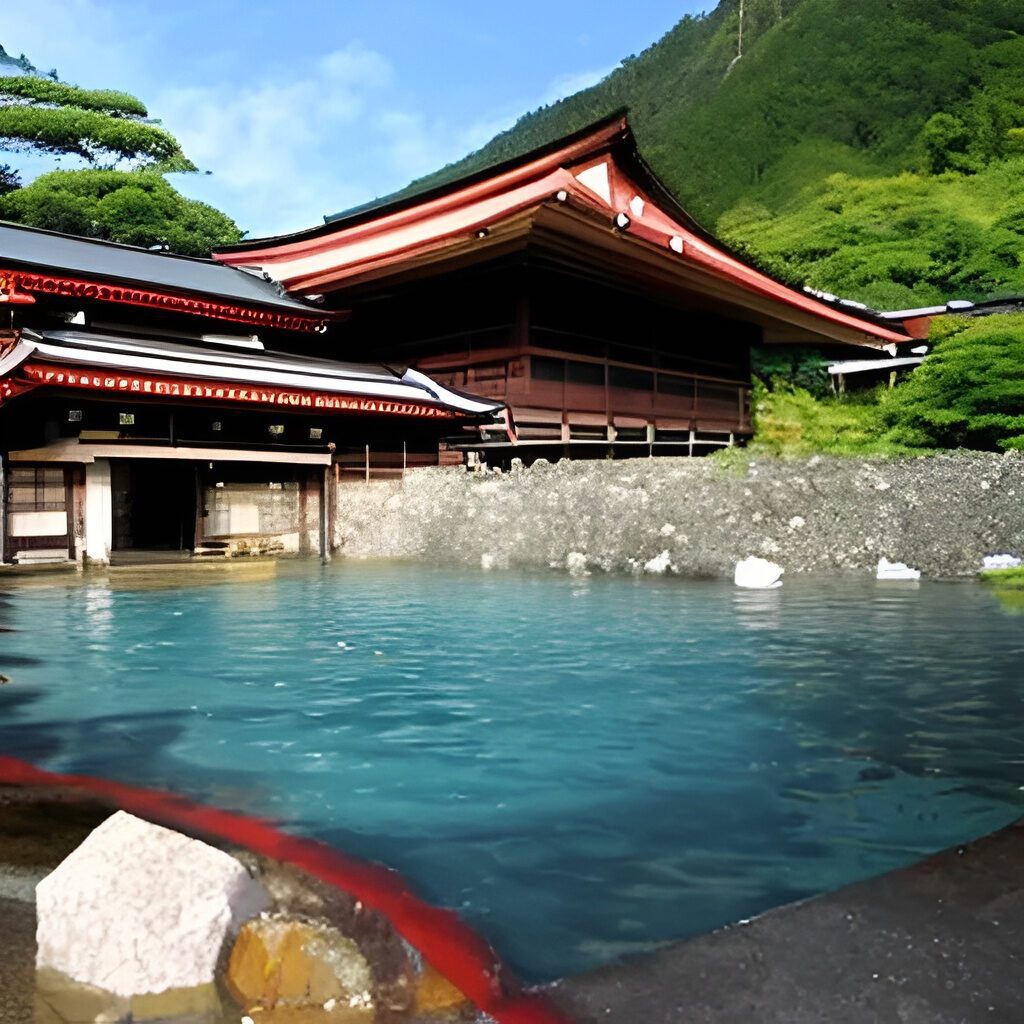An onsen is simply a hot spring in Japan. It is a popular wellness treatment, and many onsen also have baths and spas where people can soak in the warm, mineral-rich waters. Onsen are often located in beautiful natural settings and are a popular tourist attraction in Japan.
Onsen culture
In Japan, onsen culture is an important part of the country’s history and traditions. The use of onsen for relaxation and therapy dates back thousands of years, and the practice continues to be a beloved pastime for many Japanese people. Onsen are typically located in scenic areas, such as in the mountains or by the ocean, and are often surrounded by natural beauty.
Onsen are often associated with specific regions or towns, and each onsen has its own unique characteristics, such as the minerals and other properties of the water. Many onsen also offer additional services, such as massages and other spa treatments.
In addition to the physical and mental health benefits of onsen, the social aspect of onsen culture is also important. Onsen are often seen as a place to socialize and connect with others, and many Japanese people enjoy visiting onsen with friends and family.
Overall, onsen culture is an integral part of Japanese society and continues to be a popular and beloved pastime.
History of onsen
The history of onsen, or hot springs, in Japan dates back thousands of years. The natural hot springs were believed to have healing properties and were used for their therapeutic benefits. Over time, onsen became a popular form of relaxation and a way for people to connect with nature.
The origins of onsen can be traced back to the Jomon period (14,000-300 BCE), when people would gather at natural hot springs to bathe and relax. During the Nara period (710-794 CE), onsen became more regulated and developed into public bathhouses called sento. These sento were places where people could go to bathe and socialize, and they became an important part of daily life in Japan.
During the Edo period (1603-1868), onsen culture continued to evolve and became more popular among the general population. The natural beauty of many onsen locations, such as those in the mountains or by the ocean, also made them a popular destination for travelers and tourists.
In the modern era, onsen continue to be a beloved part of Japanese culture and are a popular tourist attraction. Onsen are often associated with specific regions or towns, and each onsen has its own unique characteristics, such as the minerals and other properties of the water. In addition to their physical and mental health benefits, onsen are also seen as a place to socialize and connect with others.
Overall, the history of onsen in Japan is a long and rich one, with the natural hot springs playing an important role in the country’s history and culture. From their origins as a therapeutic tool to their modern-day popularity as a tourist attraction, onsen have remained an integral part of Japanese society.
Curious to learn more? Read The origins of Japan’s hot springs by Nikkei.

Different types of onsen
There are two main types of onsen in Japan: natural onsen and man-made onsen. Both types of onsen are hot springs that are used for relaxation and therapy, but they have some important differences.
Natural onsen are hot springs that occur naturally in the environment. These hot springs are formed when water from underground reservoirs is heated by geothermal activity and rises to the surface. Natural onsen are often located in beautiful natural settings, such as in the mountains or by the ocean, and are a popular tourist attraction.
Man-made onsen, on the other hand, are hot springs that are created artificially. These onsen are often located in urban areas and are constructed using man-made pools and tubs. Man-made onsen may not have the same scenic setting as natural onsen, but they still offer the therapeutic benefits of hot spring water.
One of the main differences between natural onsen and man-made onsen is the composition of the water. Natural onsen are known for their high mineral content, which is believed to have health benefits. The minerals in natural onsen water come from the geothermal activity that heats the water, and each onsen has its own unique mineral composition.
Man-made onsen, on the other hand, do not have the same natural mineral content as natural onsen. The water in man-made onsen is often treated and mixed with chemicals to maintain its quality and cleanliness. As a result, man-made onsen may not have the same health benefits as natural onsen.
Overall, natural onsen and man-made onsen are both popular forms of relaxation and therapy in Japan. Natural onsen are known for their scenic locations and high mineral content, while man-made onsen are often more accessible and convenient. Both types of onsen offer the therapeutic benefits of hot spring water and are an important part of Japanese culture.

Benefits of onsen
Onsen, or hot springs, are a popular form of relaxation and therapy in Japan. The warm, mineral-rich waters of onsen have many physical and mental health benefits, making them an important part of Japanese culture.
One of the main physical benefits of onsen is their ability to improve circulation and relax the muscles. The warm water of onsen causes blood vessels to dilate, which can help to improve blood flow and reduce tension in the muscles. This can help to relieve pain and stiffness, and can even improve overall physical health.
Another physical benefit of onsen is their ability to detoxify the body. The minerals in onsen water are thought to help the body eliminate toxins and waste products, which can improve overall health and well-being. Onsen are also known for their skin-cleansing properties, and many people find that soaking in onsen water can improve the condition of their skin.
In addition to the physical benefits of onsen, there are also many mental benefits. The warm water of onsen can have a calming effect on the mind, and many people find that soaking in onsen helps to reduce stress and promote relaxation. The peaceful, natural settings of many onsen also contribute to their calming effect, making them a popular destination for those seeking relief from the stresses of daily life.
Onsen are also a social activity in Japan, and many people enjoy visiting onsen with friends and family. The social aspect of onsen can help to improve mental health by providing a sense of community and connection with others.
A 2012 study has shown that onsen baths can contribute to health and wellbeing. (Source: Goto, Yasuaki, Shinya Hayasaka and Yosikazu Nakamura. “Bathing in Hot Water, Bathing in Japanese Style Hot Spring and Drinking Green Tea May Contribute to the Good Health Status of Japanese.”)
Overall, onsen offer a wide range of physical and mental health benefits. From their ability to improve circulation and detoxify the body to their calming effect on the mind, onsen are an important part of Japanese culture and are enjoyed by people of all ages.
Onsen etiquette
Onsen, or hot springs, are an important part of Japanese culture, and there are a number of rules and customs that are associated with onsen etiquette. These rules are designed to ensure that everyone can enjoy the onsen experience in a comfortable and respectful manner.
One of the most important rules of onsen etiquette is that bathers must be naked. Onsen are communal baths, and everyone is expected to bathe naked in order to maintain a clean and hygienic environment. This rule may be unfamiliar to some people, but it is an important part of onsen culture and should be respected.
Another important rule of onsen etiquette is that bathers must wash thoroughly before entering the onsen. Onsen are communal baths, and it is important to ensure that everyone is clean before entering the water. Bathers are typically provided with a small stool and bucket for washing, and it is important to wash carefully and thoroughly before entering the onsen.
In addition to these rules, there are also a number of customs and behaviors that are associated with onsen etiquette. For example, it is considered rude to splash water or make loud noises in the onsen, and bathers should try to be quiet and respectful of others. It is also considered rude to swim or play in the onsen, and bathers should remain seated or lying down while in the water.
Overall, onsen etiquette is an important part of onsen culture in Japan. By following the rules and customs of onsen etiquette, bathers can ensure that everyone can enjoy the onsen experience in a comfortable and respectful manner.
If you want a more in-depth guide on onsen etiquette, I recommend you read The Ultimate Guide to Onsen Hot Spring Etiquette and Where to Enjoy a Japanese Bath.

Famous onsens around the world
There are many popular onsen locations in Japan and around the world. Some of the most well-known onsen locations in Japan include:
- Kusatsu Onsen in Gunma Prefecture
- Arima Onsen in Hyogo Prefecture
- Gero Onsen in Gifu Prefecture
- Beppu Onsen in Oita Prefecture
- Noboribetsu Onsen in Hokkaido
- Yufuin Onsen in Oita Prefecture
- Kinosaki Onsen in Hyogo Prefecture
- Shirahama Onsen in Wakayama Prefecture
- Dogo Onsen in Ehime Prefecture
- Atami Onsen in Shizuoka Prefecture
There are also many popular onsen locations outside of Japan, such as:
- Banff Upper Hot Springs in Canada
- Thermae Bath Spa in England
- Blue Lagoon in Iceland
- Reykjavik City Baths in Iceland
- Hot Springs National Park in the United States
- Glenwood Hot Springs in the United States
- Hot Springs in Budapest, Hungary
- Terme di Saturnia in Italy
- Therme Erding in Germany
- Therme Wien in Austria
While the later aren’t Japanese onsen, and won’t abide by the same rules and etiquette, and might have different kinds of amenities, they essentially bring very similar benefits to mental and physical health, albeit with a different aesthetic.
Try visiting an onsen yourself
In conclusion, onsen, or hot springs, are an important part of Japanese culture and offer many physical and mental health benefits. The warm, mineral-rich waters of onsen can improve circulation, detoxify the body, and promote relaxation. Onsen are also a social activity, and many people enjoy visiting onsen with friends and family.
If you have never experienced an onsen before, I would highly recommend trying one out. The soothing waters and peaceful natural surroundings of an onsen can provide a truly relaxing and rejuvenating experience. Whether you are looking to unwind after a long day or simply want to enjoy the therapeutic benefits of hot spring water, an onsen is a great place to do so. I encourage you to try visiting an onsen and experience the real onsen experience for yourself.
